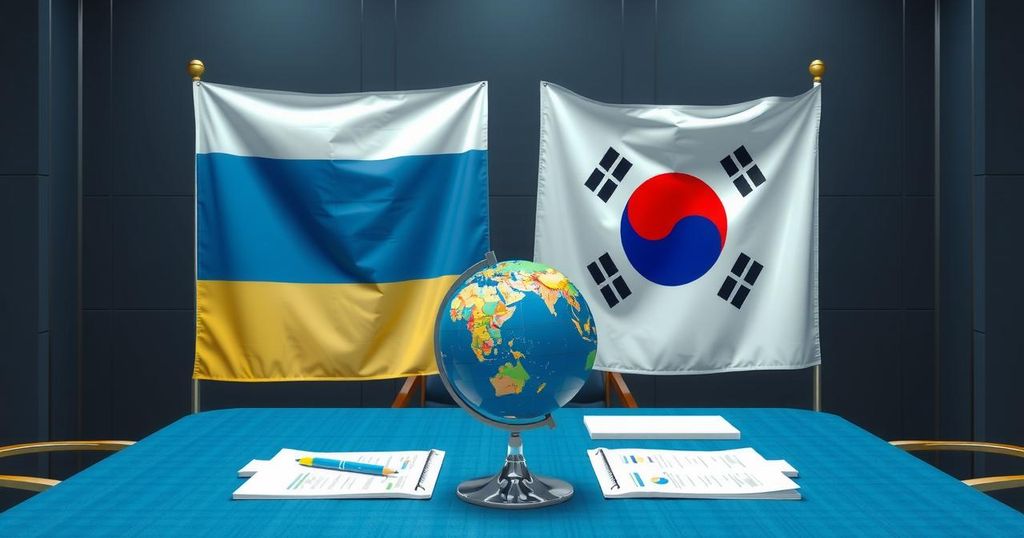Global news
AND, ANDRII SYBIHA, ASIA, BIDEN ADMINISTRATION, CHO, CHO TAE - YUL, DEFENSE, DPRK, ENERGY INFRASTRUCTURE, EUROPE, EUROPE/ASIA, KOREA, NORTH, KOREA, SOUTH, MILITARY, NATIONAL INTELLIGENCE AGENCY OF, PYONGYANG, RUSSIA, SBU, SEOUL, UKRAINE, VOL, VOLODYMYR ZELENSKY, WAR, YO, YONHAP NEWS AGENCY
Jamal Walker
0 Comments
Ukraine and South Korea Initiate Talks on Repatriation of North Korean POWs
South Korean and Ukrainian diplomats are negotiating the repatriation of two captured North Korean soldiers. The discussions reflect complex constitutional, humanitarian, and diplomatic considerations, amid significant casualties among North Korean troops deployed in support of Russia. The willingness of the captured soldiers to seek asylum is crucial, complicating the situation significantly. As tensions escalate, the geopolitical ramifications become increasingly pronounced, impacting security across multiple regions.
On March 17, 2025, South Korean and Ukrainian diplomats discussed the potential repatriation of two North Korean soldiers captured during the ongoing Ukraine-Russia conflict. South Korean Foreign Minister Cho Tae-yul and his Ukrainian counterpart, Andrii Sybiha, outlined the complexities of the negotiations and the soldiers’ need to express a desire for relocation in accordance with South Korean constitutional provisions.
The discussions arose after North Korea deployed approximately 12,000 troops to support Russia, amidst Russia’s manpower shortages. Ukrainian intelligence reported heavy casualties, estimating over 4,000 North Korean soldiers had been affected as of early January, with two-thirds presumed killed, as indicated by President Volodymyr Zelensky.
Ukraine successfully captured two North Korean soldiers alive on January 11, 2025, marking a historic first for North Korean personnel surviving capture. These soldiers received medical assistance and are currently held by the Security Service of Ukraine (SBU).
Seoul has a rich history concerning North Korean affairs, having accepted around 34,000 defectors since the late 1990s. The acceptance of the two soldiers could reinforce South Korea’s humanitarian approach but carries diplomatic risks, potentially straining relations with North Korea and Russia. The captured soldiers’ desire to defect remains pivotal; as of January, South Korean intelligence indicated they had not yet shown interest in seeking asylum.
In the conflict, North Korean troops have taken on significant roles, prompting concerns for regional security. Ukrainian official Andriy Kovalenko noted their aggressive frontline strategies, stating, “they are storming the frontlines in ‘columns.'” This observation raises worries regarding combat tactics and their devastating impact on the North Korean military due to inexperience.
Sybiha praised the partnership with South Korea and emphasized addressing the cooperation between Russia and North Korea as detrimental to security across various regions. The uncertain intent of the North Korean soldiers complicates the discussions. Their silence could reflect either reluctance to engage in international negotiations or strategies from North Korea to secure an advantageous position.
Criticism exists regarding the situation; North Korean defector Yeonmi Park accused Ukraine of violating international law by linking prisoner repatriation with arms dealings. Zelensky elaborated on the dangers faced during the capture, noting, “This was not an easy task: Russian forces and other North Korean military personnel usually execute their wounded…” This statement underscores the peril surrounding both the Ukrainian forces and the captured soldiers.
The outcome of these discussions influences both the soldiers’ fate and broader geopolitical dynamics. North Korea’s adverse stance on South Korea’s proposal signals the complexities intertwined within their relations, perpetuating a longstanding narrative shaped by historical tensions and the evolving landscape of international alliances and humanitarian principles amid ongoing conflict.
The negotiation for the repatriation of North Korean soldiers encapsulates complex diplomatic dynamics and humanitarian considerations amid ongoing international conflicts. With South Korea’s constitutional stipulations, the expressed desires of the captured soldiers, and the historical precedent of North Korean defector acceptance at the forefront, the situation reflects broader geopolitical implications. The involvement of North Korean troops in support of Russia adds urgency to the discussions, amplifying security anxiety across various regions. Ultimately, the ambiguity of North Korea’s response introduces additional layers to an already intricate scenario defined by diplomacy, military strategy, and humanitarian ethics.
Original Source: evrimagaci.org




Post Comment